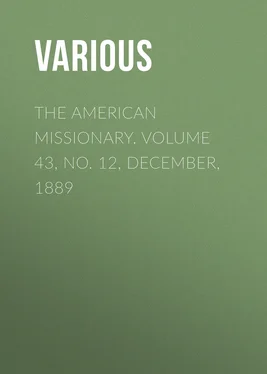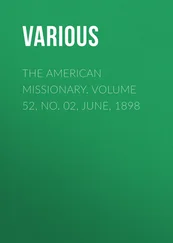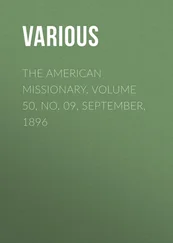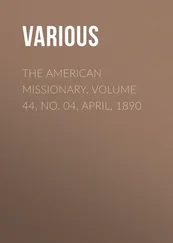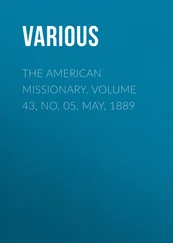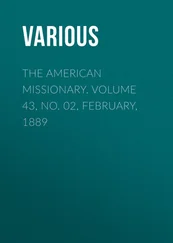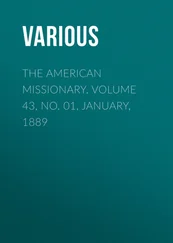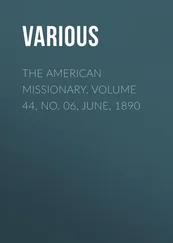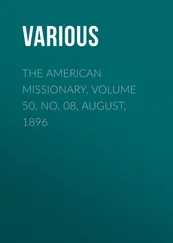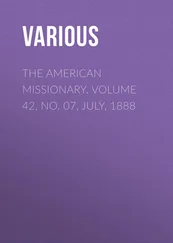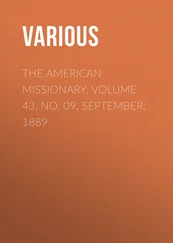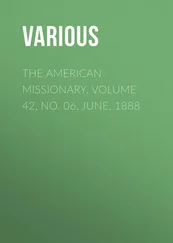Various - The American Missionary. Volume 43, No. 12, December, 1889
Здесь есть возможность читать онлайн «Various - The American Missionary. Volume 43, No. 12, December, 1889» — ознакомительный отрывок электронной книги совершенно бесплатно, а после прочтения отрывка купить полную версию. В некоторых случаях можно слушать аудио, скачать через торрент в формате fb2 и присутствует краткое содержание. Жанр: foreign_antique, periodic, foreign_edu, на английском языке. Описание произведения, (предисловие) а так же отзывы посетителей доступны на портале библиотеки ЛибКат.
- Название:The American Missionary. Volume 43, No. 12, December, 1889
- Автор:
- Жанр:
- Год:неизвестен
- ISBN:нет данных
- Рейтинг книги:3 / 5. Голосов: 1
-
Избранное:Добавить в избранное
- Отзывы:
-
Ваша оценка:
- 60
- 1
- 2
- 3
- 4
- 5
The American Missionary. Volume 43, No. 12, December, 1889: краткое содержание, описание и аннотация
Предлагаем к чтению аннотацию, описание, краткое содержание или предисловие (зависит от того, что написал сам автор книги «The American Missionary. Volume 43, No. 12, December, 1889»). Если вы не нашли необходимую информацию о книге — напишите в комментариях, мы постараемся отыскать её.
The American Missionary. Volume 43, No. 12, December, 1889 — читать онлайн ознакомительный отрывок
Ниже представлен текст книги, разбитый по страницам. Система сохранения места последней прочитанной страницы, позволяет с удобством читать онлайн бесплатно книгу «The American Missionary. Volume 43, No. 12, December, 1889», без необходимости каждый раз заново искать на чём Вы остановились. Поставьте закладку, и сможете в любой момент перейти на страницу, на которой закончили чтение.
Интервал:
Закладка:
2. The work of the Association embraces all forms of effort in both the church and the school. It was organized and chartered as a missionary society. This was its fundamental aim. It was not till 1869, twenty-three years after its organization, that the word "educational" was put into its charter. But this change did not alter the character of its work— the school is missionary, the church an educator —and this church and school work are inseparably blended. The people among whom it labors are children in knowledge, and will remain so for a long time, for there are millions of blacks, mountain whites, Indians, and Chinese in our country who cannot read and write. In Northern communities where the children grow up in Christian homes and are environed in cultured society, with the best of common schools, the church finds the material for its membership, so far forth, prepared to its hand, but among these millions of unlettered peoples the church, if it is to be pure and intelligent, must be the outgrowth of the Christian school; and the branches of the tree might as well be expected to grow up without the roots, as such churches without these schools. The work among them begins in the primary school, and follows them through all departments of industrial, normal, collegiate and theological instruction.
In all this long process the teachers are with them at every step—in the shop, the school, the Sunday-school, the prayer meeting, and the church, and often the principal of the school is the pastor of the church. Thus the church, which grows up within or along side of the school, gets the priceless boon of the personal example and influence of these Christian teachers, in refining the manners and in making character; and as the pupils are converted they enter the church to become its stable members and intelligent officers. On the other hand, the families in the church, with their kindred and friends, furnish the pupils for the school and help to sustain it by their money and prayers, both the church and the school being stronger by their mutual support and more potent in their influence in the community than if they stood apart. And even after the scholars have left the school and have entered upon the business of life, the Association is especially fitted to gather them into churches. It has occurred in several instances, in starting new churches beyond the range of our schools, that we have found them to be made up first almost wholly of graduates and students from our different institutions, and that these have remained the most intelligent and reliable members.
We have found, too, that when a church was thus organized where we have no school, we are very soon importuned to start one. In localities with a scattered population there might not be sufficient public funds to open a colored public school; in many more places they would sustain the school for only two months in the year, and in larger towns it sometimes has happened that these public schools were of such a character that the parents begged for a Christian school as a means of saving the moral purity of their children. Thus, in every way, and under all circumstances, the school and the church need and help each other. And what is true of the colored people is equally true of the whites in the mountains and elsewhere, among whom the Association is working so auspiciously, planting its schools and churches in mutual helpfulness.
The suggestion that all the church work of the denomination in the home-field be given to one society, and all the educational be concentrated in one other society, deserves thoughtful consideration, for it meets with this very serious objection, that it provides for but one collection for work that now receives two or three. The experience of our churches is conclusive against the hope that one enlarged collection would be given to the one society. For a time, a brief time, spasmodic efforts might, as in former cases, result in some special contributions, but the new experiment would certainly be more disastrous, if it should fail, than those already tried, because it would involve far greater interests.
It is not to be supposed for a moment that such consolidation is contemplated in order that the churches may escape the large responsibility now resting upon them; and if economy and efficiency are the only objects sought, we fear the result would be disappointing. Such an arrangement would not save in the number of workers in the field, and surely it is not wise business management to leave great interests inadequately supervised. Even if the consolidated society were divided into separate departments or bureaux, the supervision could not be less, if efficient, while the combination would be likely to lead to complications, and would weaken, in the several departments, the sense of individual responsibility and take away the impulse of historic life and achievement.
More work well managed and vigorously pushed seems to me to be the only plan that will satisfy the Christian conscience or meet the approval of the Master.
3. The work of the Association extends to all races of men. This claim is sanctioned by the fraternal agreement existing between it and the American Home Missionary Society, by its own history, and by the needs of the field. The agreement with the sister society says explicitly that the Association is "to pursue its educational and church work in the South among both races ." The history of the Association shows that at the beginning the populations reached by it in America were all white except the Indians and a few colored refugees in Canada.
Its home missions at the North and West were among white people: and so were they even in the South before the war. John G. Fee and his heroic associates in Kentucky, and Daniel Worth and others in North Carolina, founded churches and schools only among the whites. Berea College was for whites only, at the outset. It was not till the era of emancipation with its overwhelming flood of freedmen that the Association turned its direct and almost exclusive attention to them. It heard the voice of God in the tramp of these millions marching out of bondage into freedom, and in that voice it heard the call to itself, providentially prepared for the new era. It answered the call, without, however, abandoning its mission to preach the gospel to the whites also; and now, with its schools and churches well established throughout the South, with an open door to the whites, and especially to those in the mountain regions, it hears the voice of God calling it thither. The ready adaptation of its methods to these people, and the success of its efforts among them, attest the validity of its call and the wisdom of its response.
4. The work of the Association is not a transient one. A New England pastor at the beginning of our work for the freedmen, gave me a hearty welcome to present our cause in his pulpit, telling me frankly he did so the more cheerfully because he thought our work would soon be over—say in twenty or twenty-five years. Now that good man believed that home missions in the West, and in some of the older Eastern States, would be needed well nigh on to the millennium, yet he imagined that the blacks, just escaped from bondage, utterly poor, ignorant and degraded, would (perhaps he hardly stopped to think how) rise in twenty-five years above all need of help from any quarter in their upward struggle! But the fallacy of such a supposition is realized more since these twenty-five years have passed than it was then. It is now clearly seen that these ex-slaves will require for three or four generations the most abundant help to bring them up to the level of those Western settlers, including the Swedes, Germans and Norwegians crowding in thither, who are comparatively well-off and intelligent. And then, after that preparation of the Negro has been made, the regular work of home missions will only be fairly begun among them. The work for this people, therefore, is not transient, and the missionary society that has it in hand has before it not only a great but long-continued task.
Читать дальшеИнтервал:
Закладка:
Похожие книги на «The American Missionary. Volume 43, No. 12, December, 1889»
Представляем Вашему вниманию похожие книги на «The American Missionary. Volume 43, No. 12, December, 1889» списком для выбора. Мы отобрали схожую по названию и смыслу литературу в надежде предоставить читателям больше вариантов отыскать новые, интересные, ещё непрочитанные произведения.
Обсуждение, отзывы о книге «The American Missionary. Volume 43, No. 12, December, 1889» и просто собственные мнения читателей. Оставьте ваши комментарии, напишите, что Вы думаете о произведении, его смысле или главных героях. Укажите что конкретно понравилось, а что нет, и почему Вы так считаете.
